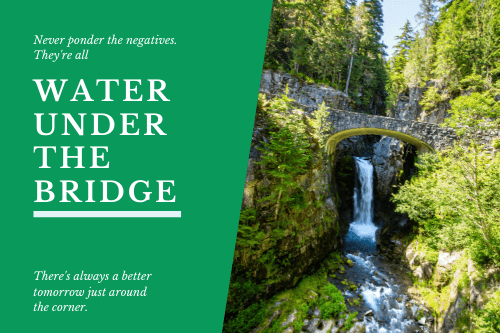
YouTube / iTunes / Spotify / Radio Public / Pocket Casts / Google Podcasts / Breaker / Overcast
Listen to ArtisanEnglish.jp posts & lesson intros here.
Phrase: Water under the bridge
Many of the expressions we use today were created by our ancestors hundreds of years ago.
Even though much time has passed, our emotions and reactions to them are still the same.
Just like back then, people today have worries and fears, and, like back then, dwelling on our fears and concerns is not beneficial.
With all of our advancements and new technologies, we are still unable to change the past.
What has happened cannot be undone, and there is no sense in worrying about it.
Even though the phrase water under the bridge has been around for centuries, we have not taken the wisdom to heart.
People still worry and fret about things they are unable to change.
Why do we do this?
Well, I suppose it is human nature to look back at history and desire to do it differently.
Everyone makes mistakes.
We have to learn from them and then let them go like water under the bridge.
I guess the water represents time.
Time flows like a river, and there is no reversing the flow.
I’m a little bit of a perfectionist, and it used to drive me up the wall when I did something wrong or had a post with a typing mistake in it.
Now, I’ve learned that it’s all water under the bridge.
Find’em, fix’em and move on.
I think the bridge represents us.
Although it may feel as if we are moving, I believe we are stationary, and it’s time that’s flowing past us.
We can stand on a bridge and watch as things float away from us in a river.
Metaphorically, we live our lives and watch as our mistakes are carried away from us by time.
It’s useless to worry about them because they are soon lost to history.
Learn from past mistakes, live in the present, and dream of the future.
Flesch-Kincaid Readability Test
This post is understandable by someone with at least a 7th-grade education (age 12).
On the Flesch-Kincaid reading-ease test, this post scores 78.
The higher the score on a scale of 0 – 100, the easier the passage is to read.

